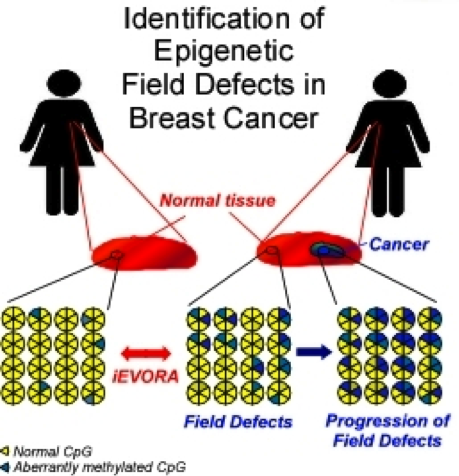

Prevention and early detection strategies are key to an improved management of cancer and cancer survival rates. A recent investigation now provides clear evidence that DNA changes are already present in healthy tissue from women with breast cancer.
Detecting molecular alterations in the early stages of breast cancer is critical for developing effective cancer prevention and early detection strategies. Researchers of this novel study focused on breast cancer, the most common women-specific cancer. They analyzed a total of 668 breast tissue samples, including ones from women without cancer, normal breast and cancer tissue from women with breast cancer, and an independent set of non-invasive and invasive breast cancer samples.

Previous research indicated that key risk factors, implicated in cancer development, slightly alter the genetic program inherent in breast cells exposed to the risk factor. These alterations are memorized by the cells over several decades. The system in cells responsible for this is called the ‘epigenome’. The epigenome is the cells’ software which gives all the different cells their identity, and is vital to an individual’s normal health and development.
By adopting a unique statistical approach developed by Professor Andrew Teschendorff from the CAS-MPG Partner Institute for Computational Biology (PICB), the Shanghai Institutes for Biological Sciences (SIBS), Chinese Academy of Sciences (CAS),a team of scientists led by Professor Andrew Teschendorff and Professor Martin Widschwendter from the Department of Women’s Cancer at University College London (UCL), demonstrated that normal tissue adjacent to breast cancer is characterized by dozens to thousands of epigenetic alterations.
Importantly, a large fraction of these epigenetic alterations were enriched in the corresponding breast cancer tissue of the same patient, supporting the view that these alterations are marking normal cells which are susceptible to breast cancer development.
Professor Andrew Teschendorff said: ”These new data show how epigenetic alterations, if detected early enough, could be used to identify women at higher risk of developing breast cancer. Since epigenetic alterations are reversible, it offers the potential to design preventive strategies. Our work further highlights the importance of inter-disciplinary work, combining clinical, biological and statistical expertise to make these findings possible.”
This finding was published in Nature Communications on January 29, 2016, as an article titled “DNA methylation outliers in normal breast tissue identify field defects that are enriched in cancer”.
Funding of this research was supported by a grant from the European Union’s Seventh Framework Programme, by The Eve Appeal (http://www.eveappeal.org.uk/), as well as CAS.
Author Contact:
Andrew E. Tschendorff, Ph D., Principal Investigator
CAS-MPG Partner Institute for Computational Biology, Shanghai Institutes for Biological Sciences, Chinese Academy of Sciences
Address: 320 Yueyang Road, Life Science Research Building A-2112,
Shanghai, China, 200031
Tel.: +86 1837170 47442
E-mail: andrew@picb.ac.cn
Web: http://www.picb.ac.cn/compsysg/